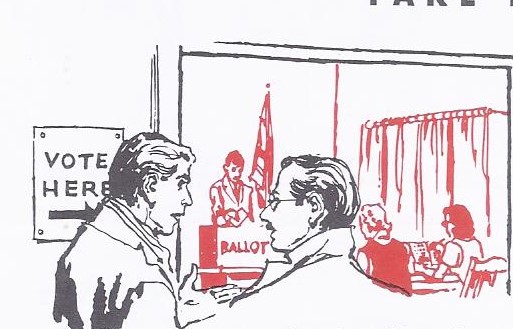Freedom! Liberty! Here are words which most Americans have heard all their lives. Freedom is the subject of the Declaration of Independence and of the Bill of Rights in our Constitution. Our patriotic songs refer to America as “sweet land of liberty” and “the land of the free and the home of the brave.”
Just what do we mean by freedom or liberty? We mean several things, for there is more than one kind of freedom. First, there is personal freedom — the right of the individual to go where he wants, to choose his occupation, to say and write what he thinks, to worship as he pleases. Secondly, there is political freedom — the right to have a share in the government. Political freedom is best achieved through democracy or rule of the people. Finally, there is national freedom or independence — the freedom of an entire people or nation from control by another state.
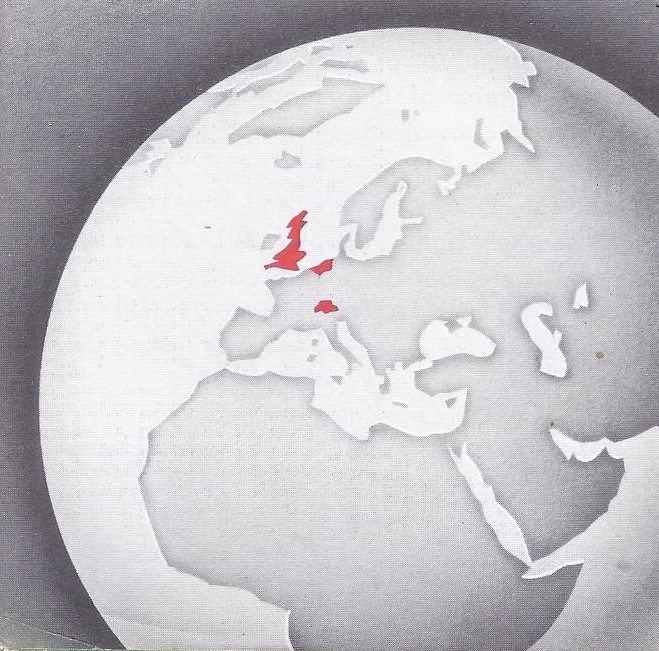
Any people that are truly free possess all three kinds of freedom — personal, political and national. To be sure, there are many things which “free” people are not “free” to do. Just because you and I possess personal liberty does not give us the right to break the laws of our community or nation. To do so would be harmful for all of us. Again, except in a small community where everybody can vote on every proposal, it is impossible for each individual citizen to take a direct part in deciding public questions. So when we speak of democracy today, we usually mean rule through representatives elected by a majority of the people.
Nevertheless, liberty is one of the highest goals of mankind. The pages of history are filled with the stirring tales of individuals or whole peoples who have sacrificed their fortunes and even their lives in the cause of freedom.
For thousands of years most human beings knew little liberty of any kind. In the ancient world, with a few exceptions such as the small group of citizens in Athens, people had little personal liberty to say nothing of democracy or sharing in their government. Under the feudal lords of the Middle Ages or under absolute rulers like Louis XIV of France, few people were free to talk, write, or act as they wished. It is only in the last two or three centuries and in fortunate lands only that a large measure of liberty has been won. Even when won it has not always been kept.

Here you will learn about the growth of freedom in the modern world. You will find that individual liberties were won and held at great cost in England. You will learn how ideas of liberty spread elsewhere in Europe but were slower to take root. You will, in brief, find answers to these questions:
1. How did Englishmen prevent absolute rule by the Stuart kings?
2. Why did some European countries gain more freedom than others in early modern times?
3. What contributions did writers make to the cause of freedom?
1. How did Englishmen Prevent Absolute Rule by the Stuart Kings?
During the 1600’s and 1700’s, no English king was able to gain such unlimited control over the government as did Louis XIV in France or Peter the Great in Russia. In fact, Englishmen engaged in a Iong-drawnout struggle to increase their personal liberties and to prevent the king from becoming too powerful. That struggle was the starting point in the general spread of modern ideas of liberty. Before tracing the growth of English liberty in the 1600’s we shall need to go back and review briefly what had happened in England in earlier times. Some of that story has already been told.
English freedom had early beginnings. The idea of liberty did not grow up overnight in England. Even in the Middle Ages, the English boasted that their nation was freer than others. The English had Magna Carta, the great charter of liberties which had been wrung from King John in 1215. They had a Parliament of two houses to assist in making laws and approving taxes. They had juries to try cases, in which no man could be punished unless all the jurymen agreed that he was guilty. Moreover, the king had no large body of soldiers always on hand to enforce his will.
Tudor power endangered English liberties. The growing power of the rulers of the Tudor family offered a threat to the freedom Englishmen had already won. To be sure, Parliament continued to meet, and the House of Commons, which was made up of country landowners and a scattering of businessmen from towns and cities, became more important than the House of Lords. For the most part Parliament carried out the wishes of the king. In order to avoid asking that body for money too frequently, the Tudors had a habit of “borrowing” from wealthy subjects who dared not refuse a royal request.
Local government remained in the hands of country gentlemen who served as justices of the peace and jury trials continued for persons accused of ordinary crimes, but under the Tudors it had become the custom to have very serious cases, such as treason, brought before the Court of the Star Chamber. This was a special royal court where there was no jury and where torture could be used to force confessions from the accused. Finally, under the Tudors there were cruel laws on the books which could be put into force against anyone who, on grounds of religion, opposed the monarch’s right to rule.
Englishmen did not oppose Tudor authority. Why, then, you may well ask, did not Englishmen resist the growing power of the Tudors during the 1500’s? The answer is twofold. (1) The Tudor kings and queens did not claim absolute power. They usually got what they wanted, but they did it shrewdly and without upsetting accepted ways of doing things. For example, instead of refusing to let Parliament meet, the Tudors managed to muster enough support within the lawmaking body to put through most of the laws they wanted. (2) Many of the policies of the Tudors helped to strengthen the English nation and thereby won popular support for the royal family. The popularity of the Tudors reached a climax in the reign of the last of the Tudors, Queen Elizabeth I.
James I disappointed his new subjects. Elizabeth left no child to succeed her, the crown of England went to the nearest heir, James Stuart, King of Scotland and son of Elizabeth’s cousin, Mary, Queen of Scots. In those days England and Scotland were separate kingdoms. Englishmen, therefore, had some doubt about this “foreigner.”
Doubt deepened into dislike when James took over his royal duties. He was awkward and ungainly, a strange contrast indeed to the queenly, dignified Elizabeth. James was quite a scholar and spent much time writing pamphlets on such topics as tobacco and witches. He was conceited and lacked judgment. He loved to argue, but always wanted his own way. Above all, he believed in his “divine right” to rule and insisted that he possessed absolute power over his subjects.
James I should be credited with two achievements. For one thing, he brought Scotland and England together peacefully under one ruler. Secondly, he gathered together a group of scholars who translated the Bible into English. The result of their work is the famous King James version of the Bible, widely used by Protestants. The King James Bible has influenced our language and literature for centuries. In general, James I’s reign (1603-1625) was one of blunders and quarrels, especially in religious matters.
James I quarreled with the Puritans. James supported the Church of England and expected his subjects to do so. He liked its ceremonies, services and became angry with Englishmen who felt differently. There were many Protestants who wanted to “purify” the Church of England. They wanted churches that were plain, not ornamented. They wanted church services without robed clergy or processions or printed prayers. James had no sympathy for such “Puritans,” and insisted that they accept his views on religious services and ceremonies. “I will make them conform or I will harry [drive] them out of the land,” he declared at the outset of his reign.
The Puritans became opposed to the king’s power. Many Puritans were indeed driven from England during the period of the Stuart kings. We know already how some Puritans settled in New England but the great majority of them remained in England, where they opposed James and his successors not only in religious matters but in government. The Puritans firmly believed in obeying God’s will as they found it written in the Bible. This divine will, they reasoned, was a higher law than the will of kings. Just as God guided kings, argued the Puritans, so did God guide the thinking of members of the House of Commons.
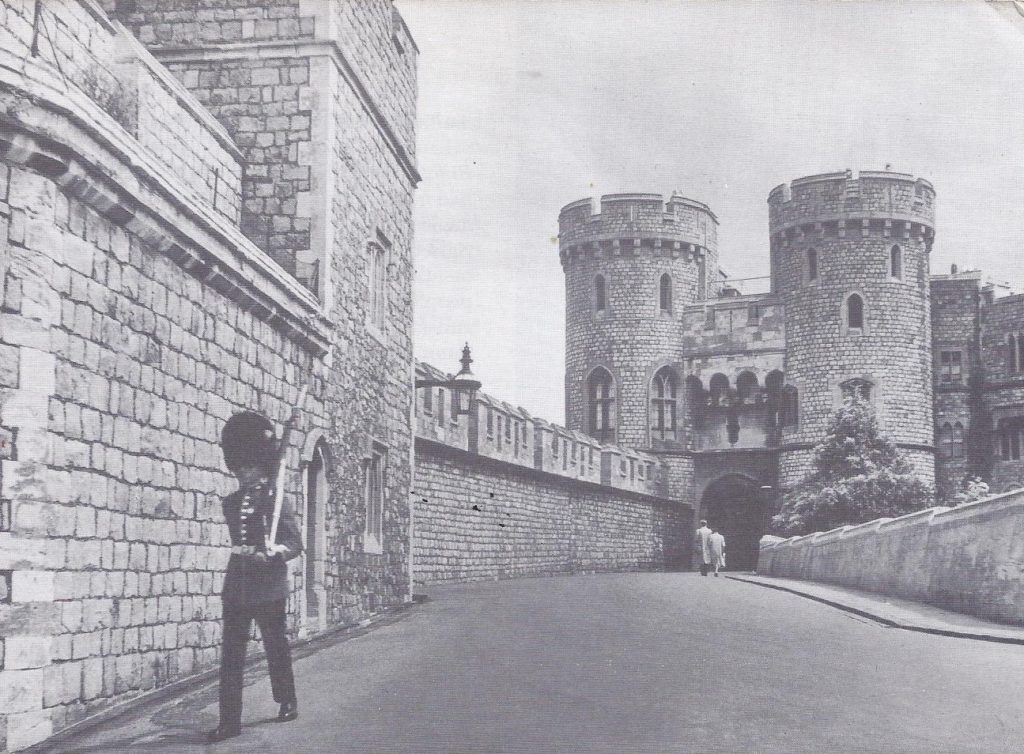
According to this Puritan line of reasoning, England’s kings had limited powers — powers defined by custom, set by law and limited by Parliament. This argument clashed directly with the Stuart claim that kings were divinely chosen to rule their people and since there were many Puritans in the House of Commons, England was headed for a bitter struggle over religion and the extent of royal power. This struggle came to a head in the reign of James’ son, Charles I.
Charles I and Parliament quarreled. Charles was quite different from his father. Charles was dignified, handsome and courageous. His very courage, however, made him less wise than his timid father.
James had merely blustered and scolded Parliament, but Charles made up his mind to crush that body and make his power as absolute as that of the kings of France and Spain. Charles failed to understand how deeply Englishmen cherished their liberties and how determined many of them were to uphold the rights of Parliament.
When Charles called Parliament into session, each meeting brought fresh quarrels. Sometimes the quarrel was about money, sometimes about the King’s choice of officials, sometimes about religious practices. Each time the angry King dismissed Parliament.

Charles agreed in the Petition of Right. By 1628 Charles was badly in need of money, so he called Parliament together once more, but the stubborn members of the House of Commons decided to limit royal authority through their control over taxes. They passed a Petition of Right which declared that the king (1) had no right to collect taxes without Parliament’s consent (Charles had claimed the right to levy customs duties without Parliament’s consent), (2) could not force people to house soldiers in their homes and (3) could not impose military law in times of peace. To get the funds he needed from the House of Commons, Charles had to agree to the Petition of Right.
The Petition of Right is one of the great foundation stones of English liberty. It is also part of the collection of laws and customs beginning with Magna Carta that make up England’s constitution.
The quarrel between King and Parliament became more serious. King Charles now decided to govern without Parliament. For eleven years, from 1629 to 1640, he did not call that body together, with the result that Englishmen had no representation in their government. These were years of oppression, especially for the Puritans. A single illustration will show how bad conditions were.
A Puritan named Prynne, who published a book condemning all plays and actors as immoral, was cruelly punished for his boldness. Prynne was deprived of his degree from Oxford University, barred from practicing law, heavily fined, forced to stand in the pillory and had both his ears cut off. As if these penalties were not more than sufficient, Prynne was sentenced to prison!
Without Parliament, Charles had to seek other means of raising money. The King and his ministers tried to raise the needed funds by collecting fines and obtaining forced “loans” which were not repaid. They also used for other purposes money supposed to he spent on the navy, but when a revolt against Charles broke out in Scotland, the King had to raise an army. To obtain the extra funds be needed, Charles was forced to summon Parliament.
Civil war broke out between King and Parliament. The Parliament that met in 1640 gathered in an angry mood. So King Charles dismissed it, ordering a new election. The new Parliament, however, was even more hostile to Charles. It earned the name of the Long Parliament because it was in session on and off for 20 years!
At once the Long Parliament clashed with the King. It caused some of the King’s supporters to be imprisoned and executed. It did away with the special courts which collected heavy fines to fill the King’s empty treasury. This Long Parliament also passed a law that it could not be dismissed without its own approvals. The angry Charles, sorely in need of cash for his war in Scotland, had to agree to all these laws. Afterward, however, he sent soldiers to the House of Commons to arrest the Puritan leaders of the Long Parliament. They had been warned in advance and Charles’ highhanded action failed. All it accomplished was to create more bitterness. In 1642 King Charles fled from London to raise an army with which to subdue the offending House of Commons.
For three years England suffered from civil war. On one side were those who stood for the King and the Church of England. Those who took this side were called Cavaliers, as if they were gallant knights of olden times. Church of England clergy and many country gentlemen and nobles were numbered among the Cavaliers. On the other side were those who supported Parliament and favoured Puritan reforms in religion. They were called Roundheads because they cut their hair short instead of letting it grow long in the fashion of the court. Many townsmen and members of the middle class were Roundheads. At first the Cavaliers won most of the battles, but the tide turned when Oliver Cromwell became leader of the Roundheads.
Cromwell’s Roundheads defeated and executed King Charles. Cromwell was a country gentleman who had organized a well-trained cavalry force, the “Ironsides.” Under Cromwell the Roundhead army was remodeled into a better disciplined and more effective fighting unit. This “new model army” defeated the Cavalier forces in 1644 and came close to destroying Charles’ army a year later.
King Charles escaped to Scotland, but the Scots turned him over to Cromwell’s forces. Then Parliament and Cromwell began to quarrel over religious matters and what to do with Charles. Finally the stern Cromwell lost patience and decided to take matters into his own hands. One of his officers barred from Parliament all members except those who could be trusted to agree with Cromwell’s point of view. Charles was then tried for treason and condemned to death.
On a chilly January day in 1649, Charles Stuart, crowned King of England, Scotland and Ireland, climbed the scaffold to be executed. A silent throng of people jammed the nearby streets, stood on roofs, or peered from windows to witness the strange sight. Here was a king about to be beheaded on a charge of treason, when treason had hitherto meant rebellion against the king! Charles, whose rule had been marked by rashness and bad judgment, met his death with courage and dignity.
TIMETABLE A CENTURY OF STUART RULE
James I, ruler of Scotland, inherited the crown of England also, 1603 -1625
Charles I struggled for power with Parliament, was defeated in civil war and beheaded, 1625 – 1649
The Commonwealth, a Puritan “republic,” was dominated by Oliver Cromwell and the army, 1649-1660
Charles II restored the monarchy and compromised with Parliament, 1660-1685
James II defied Parliament on religious questions and “lost his crown but saved his head” in the Glorious Revolution, 1685 – 1688
William III, ruler of Holland and his wife Mary, daughter of James II, accepted Bill of Rights and ruled with Parliament’s consent, 1689-1702
Anne, Mary’s sister, became ruler of England and Scotland, united under one Parliament and flag, 1702-1714
England became a Commonwealth. For a few years after Charles’ death, England had a government called the Commonwealth. England was ruled by a council chosen by those members of Parliament whom Cromwell had permitted to remain. England continued to face troubled times. Troops had to he sent to Scotland and Ireland to put down uprisings against the new government. Moreover, what was left of Parliament quarrelled with leaders of the army.
Oliver Cromwell took over control of the government. Once more Oliver Cromwell took action. In a dramatic scene he strode into Parliament with 30 soldiers at his back. According to one report Cromwell thundered, “I will put an end to your prating [idle talk]! You are no Parliament. I say you are no Parliament. I will put an end to your sitting.” Then he ordered the members of Parliament to leave and locked the door. In short, the war fought to preserve freedom and representative government against the ambitions of Charles had only led to a military dictatorship under Cromwell.
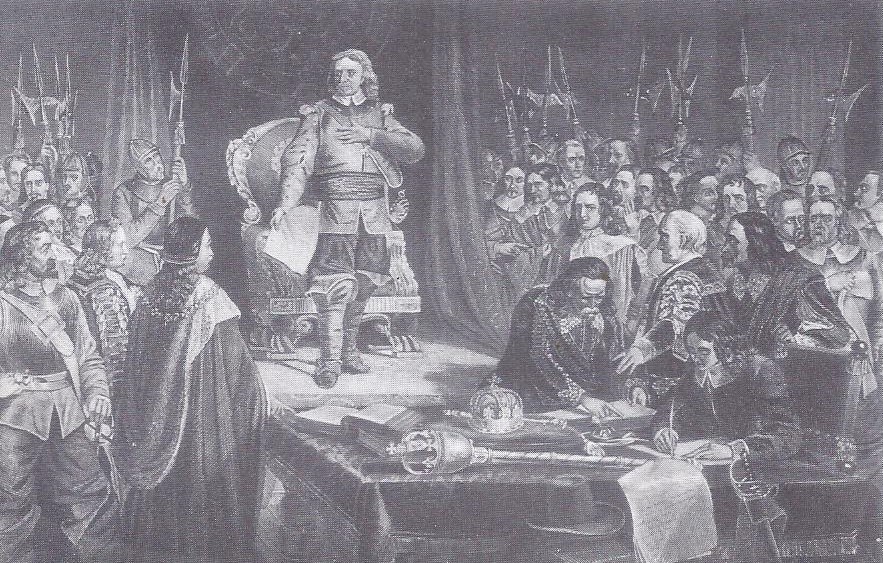
To do him justice, Oliver Cromwell was an unwilling dictator. He tried again and again to establish some regular form of government, but every attempt failed. So Cromwell, as Lord Protector, ruled with the aid of his army. In many ways he ruled well. He built up England’s navy and merchant shipping. He fought and defeated the Dutch and the Spanish at sea. He extended religious freedom to include nearly all groups of Protestants and the Jews who hitherto had been persecuted, but as with most dictators, Cromwell’s success lasted only so long as he himself held the reins of power. When he died, the army-supported government collapsed. Cromwell’s son Richard possessed neither the ability nor the desire to carry on the dictatorship.
Englishmen restored the Stuart kings. For about twenty years, as we have seen, unrest had gripped England. From 1642 until the execution of Charles I in 1649 there was civil war, confusion and then Cromwell ruled with the backing of the army. Even though Cromwell’s control brought certain benefits, Englishmen in general were not happy. They did not take kindly to military rule. Actually they had not objected to having a king. What they had opposed was a king who had too much authority, who had no regard for their rights and who allowed them no part in government. However, rule by a dictator was no better. Englishmen therefore were glad when a new Parliament asked the son of Charles I (the king whom they had executed for “treason” only a few years before) to return to England as its king!

The coronation of Charles II was a gala affair. In our own times the coronation of Queen Elizabeth II attracted worldwide attention. Thousands of visitors flocked to England in 1953 to share the holiday spirit and to view the age old ceremonies. Millions of others read detailed stories of the coronation in their newspapers or followed it on television or in motion pictures. Three hundred years earlier, in 1661, Englishmen had been no less thrilled by the coronation of Charles II. A certain Samuel Pepys (peeps), who later became famous for his writings, was on hand to witness the great event. Pepys got up early. By four o’clock in the morning of April 23 he was at Westminster Abbey, where England’s rulers are crowned. Here are some of his impressions which he recorded in his diary:
. . . With a great deal of patience I sat from past four till eleven. . . , At last comes in the Dean . . . the Bishops . . . the Nobility, all in their Parliament robes, which was a most magnificent sight. Then . . . the King with a scepter . . . and sword and wand before him, and the crown too. . . . There was a sermon . . . and then . . . the King passed through all the ceremonies of the Coronation, which to my great grief I and most in the Abbey could not see. The crown being put upon his head, a great shout began, and he came forth to the throne; and there did pass more ceremonies: as taking the oath, and having things read . . . by the Bishop. . . . And three times . . . the herald
. . . proclaimed that if anyone could show any reason why Charles Stuart should not be King of England . . . he should come and speak. . . .
I went . . . round the Abbey to Westminster Hall . . . the ground covered with blue Cloth; and scaffolds [bleachers] all the way. Into the Hall I got . . . at last. . . . The King came in with his crown on, and his scepter in his hand, under a canopy borne up by six silver staves . . . and little bells at every end. . . . And after a long time . . . all set themselves down. . . . And many fine ceremonies there was [were] of the herald’s leading up people before him, and bowing. . . . I took a great deal of pleasure to go up and down, and look upon the ladies, and to hear the music of all sorts, but above all . . . the twenty-four violins.
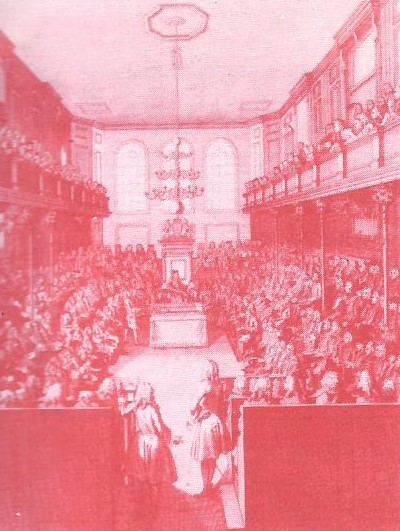
(In a bill passed in 1689, Parliament summed up the rights which it had defended against the Stuart kings. The bill established Parliament’s control over governments and kept future kings from putting illegal pressure on citizens.
England’s Bill of Rights
Suspending of laws . . . [by the King’s] authority without consent of Parliament is illegal.
Levying money for . . . the use of the Crown . . . without consent of Parliament . . . is illegal.
It is the right of the subjects to petition the King. . . .
Raising or keeping a standing army within the kingdom in time of peace, unless it be with consent of Parliament, is against law.
Election of members of Parliament ought to be free.
The freedom of speech . . . ought not to be . . . questioned in any court or place out of Parliament.
Excessive bail ought not to be required, not excessive fines imposed, nor cruel and unusual punishments inflicted.
For the amending, strengthening and preserving of the laws, Parliament ought to be held frequently.)
Charles II proved far more popular than his brother, James II. King Charles II was a gay and witty monarch who joked that he had “no desire to set forth on his travels again.” In other words, he was resolved to do nothing which would cost him his throne. So Charles did not openly defy Parliament as his father had. Though at heart he was a Roman Catholic, outwardly he supported the Church of England and kept his faith secret until just before his death. Under Charles II court life and England generally became gayer. The stern Puritan rules enforced under Cromwell against dancing, card playing, theatre going and the like, were relaxed.
Next in line to the throne after the shrewd and cautious Charles II was a younger brother, James II. The fact that James was openly a Catholic caused a large party in Parliament to oppose his becoming king. The new King soon showed that he had learned little from, the fate of his unfortunate father. After a rebellion against him had been crushed, harsh punishments were dealt out to those who had opposed the King. In an effort to give fellow Catholics privileges previously denied to them, James tried to extend religious freedom to all groups, without Parliament’s permission. When seven bishops of the Church of England protested, the King sent them to prison.
James II lost his crown but saved his head. The birth of a royal son caused the smoldering anger against King James II to burst into flame. Englishmen knew this child would be brought up a Catholic and most of them were Protestants who did not want a line of Catholic kings. In 1688 the so-called Glorious Revolution broke out and King James was forced to flee from England. Parliament then invited William of Orange and his wife, Mary, daughter of the exiled James II, to rule England. When William died in 1702 (Mary having died earlier), Mary’s sister Anne became queen. Under Anne the Scottish Parliament was united with the English and England and Scotland became the Kingdom of Great Britain. Thus the task of uniting the two countries begun by James I was completed.
The Glorious Revolution established new freedom in England. The Glorious Revolution was an important milestone in the growth of English liberty. Parliament was determined that no English king should override its authority. Ever since that time, Parliament has had the right to decide who may be England’s ruler and whom he or she may marry. Moreover, in 1689 Parliament passed the Bill of Rights to settle once and for all the points on which Stuart kings and Parliament had disagreed. Some important provisions are listed.
This Bill of Rights, together with Magna Carta and the Petition of Right, is a foundation stone not only of English but of American liberty. We find that the quotations from the American Bill of Rights contain some of the ideas and phrases found in the English Bill of Rights. In adding guarantees of personal liberty to the American Constitution, our fore-fathers showed that they were determined to keep for themselves the hard-won rights listed in the English Bill of Rights.
Another outcome of the Glorious Revolution in England was the Toleration Act, which gave freedom of worship to Protestants who did not belong to the Church of England. Many years passed, however, before these dissenting Protestants could hold office in England. Not until 1829 did Catholics have the right to hold office in England and Jews did not gain this right until later. Nevertheless, by 1700 an Englishman had more freedom than most of the people in Europe. He could not be taxed without the consent of Parliament. He could write books without their being censored. He could not be arrested except on definite charges. If arrested, he was assured of a prompt trial by jury.
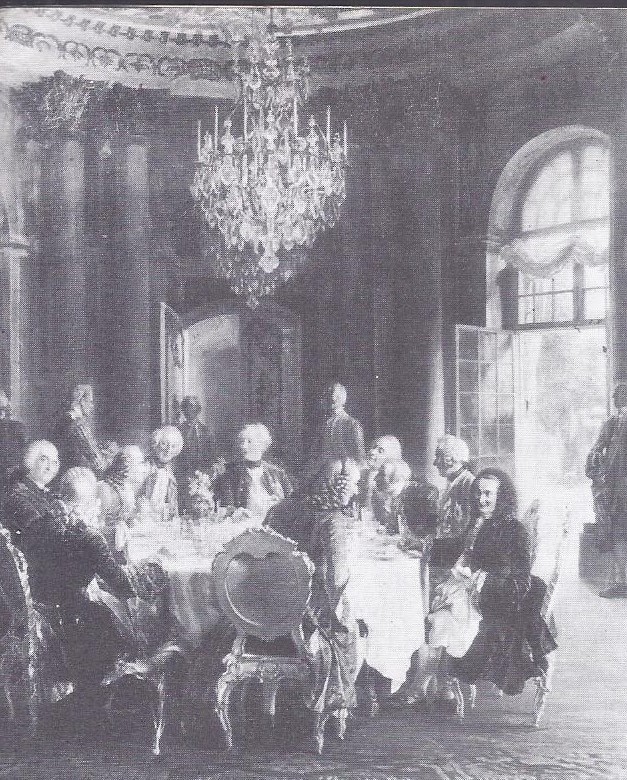
Englishmen had freedom but not democracy. Great though these gains in freedom and self-government were, they did not spell democracy. Parliament could limit the power of kings, but the majority of Englishmen as yet had no share in selecting the members of that body. As late as 1832 no more than five percent of all Englishmen had the right to vote for members of the House of Commons. We will learn ahead how England became more democratic. Meanwhile let us see how liberty was faring on the mainland of Europe.
2. Why Did Some European Countries Gain More Freedom Than Others in Early Modern Times?
Survival of the feudal system slowed up the growth of freedom. Freedom made less headway on the continent of Europe than in England. For one thing, the feudal system disappeared more slowly on the Continent. Under the feudal system, as you know, serfs obeyed their landlords and the local landlords obeyed more powerful lords. Rights were not shared equally by all. There was one set of rights for the nobles and clergy, another set for freemen and still another for serfs. Only in towns and cities which managed to keep charters that had been granted by kings did ordinary people have an opportunity to manage their own affairs, but even in the cities the right to buy or sell and even to work, was regulated by the guilds.
There was little liberty under powerful monarchs. During the 1500’s and 1600’s, moreover, the increase of royal power blocked the growth of freedom in Europe. We already know that absolute power developed in France under Louis XIV and in Russia under Czars Ivan IV and Peter the Great. Austria, Spain, Prussia, Portugal, Denmark and most of the little states of Germany and Italy also became absolute monarchies. The rulers of these states allowed their subjects no voice in government. They condemned and punished people without trial. They raised and spent money as they wished. They decided what the religion of their subjects should be. In short, royal power everywhere rode over anybody — nobles, clergy, freeman, serfs — that had the bad luck to be in the way.
Some European rulers became “enlightened despots.” Even as late as the 1700’s, there was absolute rule almost everywhere on the continent of Europe. Some rulers, to be sure, tried to improve the condition of their subjects. These rulers have been called “enlightened” or “benevolent” despots, meaning intelligent, well-meaning, though still all-powerful, rulers. Though some of them permitted their subjects to enjoy personal liberty, none of them believed in democracy or popular self-government. On the contrary, they distrusted the people. They believed that kings themselves should be powerful so that they could use their power to benefit their subjects. Frederick of Prussia, Joseph II of Austria and Catherine of Russia were examples of benevolent despots.
Frederick the Great was the most successful of the enlightened despots. Louis XIV of France used to say, “I am the State,” but Frederick the Great of Prussia called himself the “first servant of the State.” Frederick tolerated all religions, perhaps because he had no well-formed religious beliefs himself. If Turks came to Prussia, he used to say, he would build mosques where they could worship.
In many ways Frederick served his people well. He saved public money almost like a miser, spending little on anything except his very efficient army. Taxes were heavy, but there was no national debt. Frederick also built up new industries and improved farming. He did away with torture in criminal trials and insisted that the courts give swift justice in all cases. He laboured longer hours at his desk than most peasants did in the fields. He looked after every branch of the government personally, trusting nothing to favourites or courtiers. On the whole, Frederick was the most successful of all the enlightened despots, yet the condition of his subjects was far from happy. Many of the peasants still remained serfs.
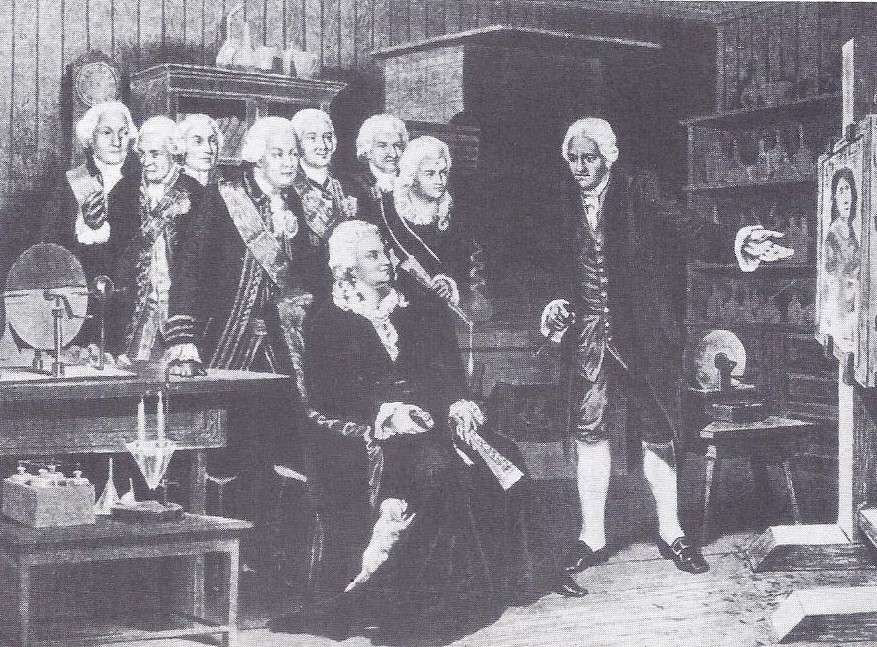
Joseph of Austria and Catherine ll of Russia posed as enlightened despots. Joseph II, Holy Roman Emperor and ruler of Austria in the late 1700’s, was less practical than Frederick. He tried not only to abolish serfdom and grant religious toleration, but to reform the system of taxes and government. He also attempted to force all his subjects to use German as the official language. In fact, Joseph II tried to do so much in so short a time that he achieved almost nothing.
Catherine II (the Great), though a German-born princess, became a patriotic ruler of Russia. Catherine opposed punishment by death and talked about religious toleration for everybody. She introduced vaccination. Yet, the great mass of serfs in Russia remained as miserable as ever. In spite of her fine talk, the Empress rarely listened to the complaints of her humblest subjects. Few so-called enlightened despots did.
Enlightened despotism did not satisfy the demand for freedom. There were enlightened rulers in other European countries besides Prussia, Russia and Austria during the 1700’s. The halfway measures which these rulers took improved the condition of their subjects somewhat – and perhaps avoided or postponed popular uprisings, but for several reasons enlightened despotism was not a satisfactory answer to the demands for liberty and self-government which were stirring the peoples of Europe.
1. Enlightened despotism was half-hearted. A ruler like Frederick was interested in improving the condition of his subjects up to a certain point, but he was more interested in building up his power in Europe. Most of the despots, we yave read about, engaged in wars of aggression against neighbouring states.
2. Enlightened despotism was uncertain. Even if a particular ruler made an honest attempt to improve the lot of his subjects, his successor might be weak or vicious. All the gains made under the enlightened despot might then be lost.
3. Enlightened despotism failed to give the people a share in the government. Enlightened despots felt that things should be done for their people but not by them. Such a system gave the people no feeling of self-reliance. It encouraged them instead to do what they were told. Enlightened despotism ignored the growing feeling that freedom was a right, not a gift which a ruler might grant or withhold.
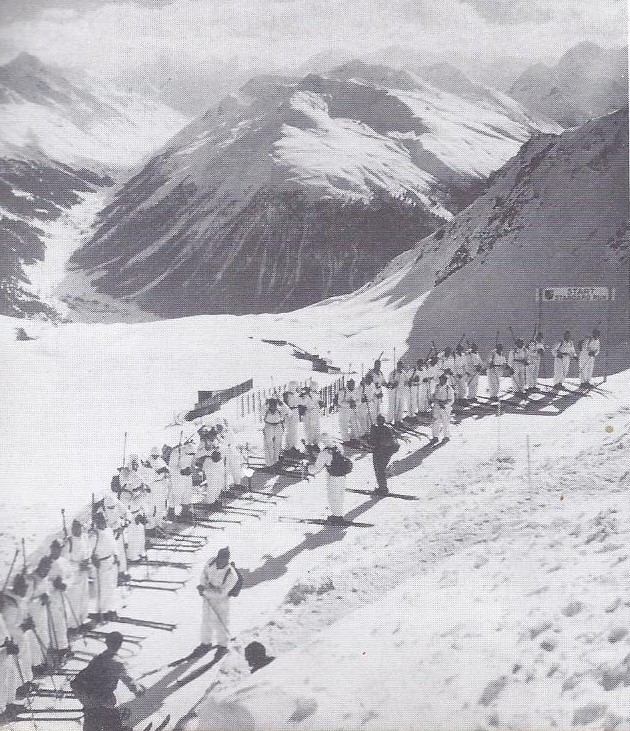
The Swiss army, though small, has for centuries ranked among the best-trained in Europe. Swiss ski troops today are prepared to defend their country even on the mountainsides of the towering Alps.
There was little self-government anywhere. In brief, on the continent of Europe in the 1600’s and 1700’s there were only a few governments that were not absolute monarchies. In Poland feudal nobles had more power than the king, but the common people were no freer than under an absolute ruler. Sweden, as you have read, had a lawmaking body, but that body had little power. There were still a few small city republics such as Venice and Genoa in Italy, but they had lost their power. Except for England (where the Stuarts tried to establish absolute power but failed) the only parts of Europe in which the people attained real self-government in early modern times were Switzerland and the Netherlands.
The Swiss began their struggle for freedom early. The land occupied by the Swiss had been part of the Holy Roman Empire for centuries. The Swiss, however, resented the growing power of the Hapsburg family of Austria. In the late 1200’s, the people of three little districts in the Alps (called cantons) formed a league to protect themselves and broke away from Hapsburg control.
Certain famous stories are connected with the Swiss struggle for freedom. You have probably heard the one about the brave Swiss mountaineer William Tell. The cruel Austrian governor heard that William Tell was a good shot with the crossbow. Balancing an apple on the head of Tell’s son, the govemor ordered the father to shoot at it, to prove his skill. Another story tells of a Swiss hero who broke the ranks of Austrian spearmen by grasping as many enemy spears as he could reach and pressing them into his body. His comrades, armed with short axes, were then able to close in. These stories may be only legends but they show the courage and fighting spirit of the Swiss in their struggle for freedom.
Other towns and cantons joined the original three cantons until by about 1400 Switzerland had reached almost its present limits. The high, rugged Alps provided protection by making invasion difficult and Swiss soldiers ranked among the finest in Europe. Neighbouring rulers learned that it paid to let the Swiss alone. In 1648 the complete independence of Switzerland from the Holy Roman Empire was officially recognized. Later Napoleon dominated the Swiss, but his power over the country lasted only a few years. Switzerland continues today as a free republic.
Switzerland developed self-government. Each Swiss canton had its own government, like those of modern day states. In some of the smaller cantons the people themselves made laws by direct vote, as in a town meeting. In the larger cantons the people chose representatives to govern them. The cantons were loosely joined together and until the late 1800’s the central government had little power. Now there is a national legislature of two houses, an executive council, and a president.
The Dutch fought hard for their independence. We have already read the story of the Dutch revolt against Spain. William the Silent, the leader of that movement, has aptly been called the Washington of the Dutch. Like George Washington, he was the father of his country. Like Washington, he had to endure many years of defeat and disappointment. Time and again he would build up an army, only to have it beaten by the well-trained soldiers of Spain. Not until 1648 was Dutch independence formally acknowledged. Later the Dutch had to defend their country against the attacks of Louis XIV of France and were often at war with England. One Dutch admiral tied a broom to the mast of his ship to tell the English that he would sweep the seas clear of English vessels. Meanwhile Dutch traders and colonizers had made Holland one of the leading colonial powers.
The Dutch enioyed self-government and freedom. Each of the seven Dutch provinces ruled itself, as did the Swiss cantons. In addition there was a common legislative body. There was also a President, called the Stadtholder, usually chosen from the House of Orange, the family of William the Silent. The powers of the legislature and the Stadtholder were limited by the cities and provinces, which jealously guarded their privileges.
The individual Dutchman had a great deal of liberty. Though a majority of the Dutch were Calvinists who belonged to the Dutch Reformed Church, in time they welcomed to Holland people who were mistreated because of their religious views. People from England, France and Germany flocked to Holland to escape religious persecution. Among them were the Pilgrims who later went to America in the Mayflower. There was freedom of the press in Holland, which meant many French writers had their books printed in some Dutch town. In that way they could express religious and political ideas without fear of the French king’s censors.
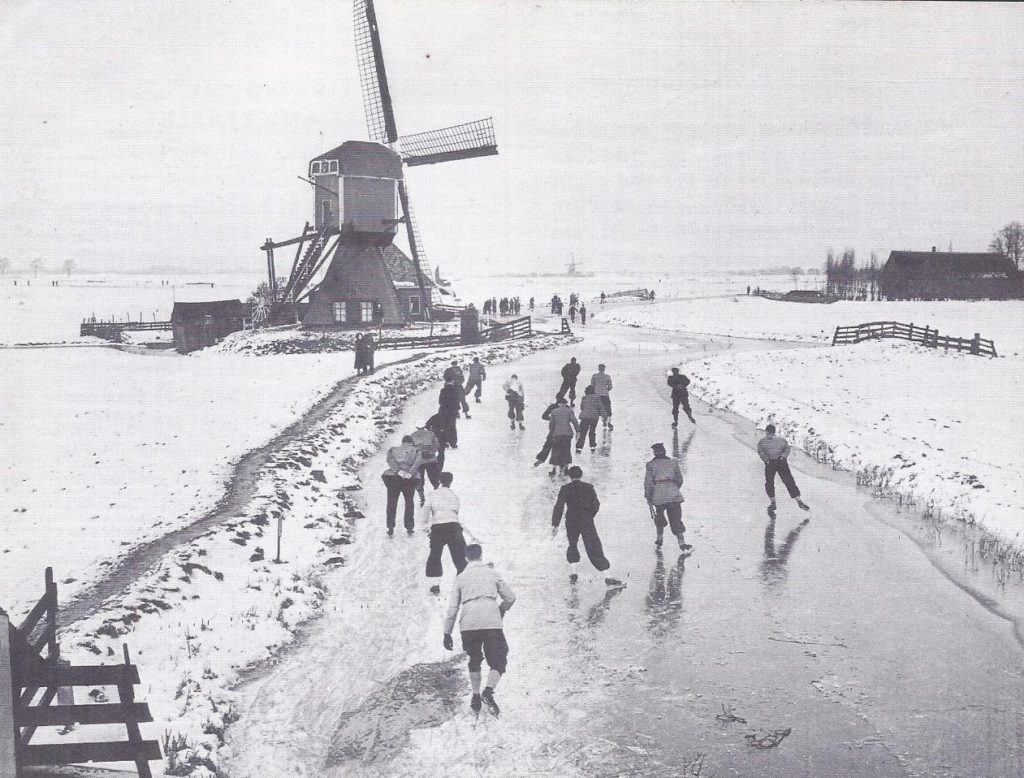
The Dutch people are famous skaters and scenes of this sort become common when Holland‘s canals freeze over in the winter. This windmill is one of many built to pump off water from lands lying below sea level, a job now done by electricity.
The Dutch people contributed much to European civilization. The Dutch were not only free and prosperous; they excelled in art, science and literature. Many foreigners attended Dutch universities and schools. Grotius, whose book on the Law of War and Peace began the modern study of international law, or law between nations, was a Dutchman. Dutch painters loved to portray the dignified merchants and sturdy fishermen of their native land and to paint its quiet landscapes of windmills, canals and shifting clouds. Rembrandt was perhaps the most famous of all artists of the 1600’s.
At a time when many European cities reeked with filth, Dutch towns were famous for clean streets and neat houses. The Dutch were fond of gardening and grew rare varieties of tulip bulbs. The fact that the Dutch excelled in so many activities led to a common phrase for any wonderful achievement, “It beats the Dutch!”
3. What Contributions did Writers Make to the Cause of Freedom?
Writers like John Locke developed new ideas of political liberty. Although freedom actually existed in only a few European countries in the 1600’s and early 1700’s, a number of writers were preaching the rights of man. These writers were not content to accept conditions as they were, but boldly proposed new ideas of political liberty. “Men being . . . by nature all free, equal, and independent, no one can be . . . subjected to the political power of another without his own consent,” wrote an Englishman named John Locke in 1690. This was two years after England’s Glorious Revolution.
John Locke was born in 1632. He had seen what had happened to personal liberty under both the Stuarts and Cromwell. He knew what tyranny meant. He also knew that certain scientists had concluded that all things in nature were governed by natural laws. Locke stated that men, too, were governed by natural law — the law of reason. He wrote that “reason . . teaches all mankind who will but consult it, that being all equals and independent, no one ought to harm another in his life, health, liberty, or possessions.” Locke therefore argued that if a government fails to protect citizens in these rights, the people are justified in changing that government for a better one. You can see that Locke had no use for notions such as the divine right of kings.
Many people picked up Locke’s ideas and carried them further. If you will read the Preamble (introduction) to the Declaration of American Independence, you will see that Thomas Jefferson, its author, was familiar with Locke’s ideas. There were very few newspapers and no radios in those days, there were neither news commentators nor columnists to discuss ideas and influence people’s thinking. Instead, the new ideas of natural law, reason, justice and equality for all were spread by writers of books, plays, poems and pamphlets.
Voltaire and Montesquieu attacked evils and preached the rights of men. One of the most influential writers in Europe in the 1700’s was the Frenchman Voltaire. He was famous as the author of stories, plays and poems, but above all for his attacks upon the intolerance of some of the clergy of his day and the evils which he saw in the government. Voltaire lived much of his life in foreign lands where he was free to say and write what he pleased. This freedom seemed to him a precious thing and one of his most famous sayings was, “I disapprove of what you say, but I will defend to the death your right to say it.” Voltaire was vain and at times spiteful but his writings proved the saying that “the pen is mightier than the sword.” Even kings and high-ranking officials feared Voltaire’s attacks upon their injustice and misrule.
Another influential French writer was Montesquieu. He, too, sharply criticized the government of France. Some of his writings Were published in Holland where, as you have read, there was freedom of the press. Montesquieu favoured a division of any government into three parts — Iawmaking, law enforcing and law interpreting — very much as was later done in the Constitution of the United States.
Rousseau preached democracy. A Swiss-born Frenchman named Rousseau brought a keen love of liberty from Switzerland to France. Like Voltaire, Rousseau had a sword-like pen, but unlike Voltaire, who stressed the advantages of civilization, Rousseau asked people to go back to nature and live simply. He wrote that “nature made men happy and good, but society [the civilization in which man lives] makes him miserable.” Rousseau believed in a pure democracy, a government created by the consent of the people. “Man is born free; and everywhere he is in chains. . . .” Speaking of the kind of government needed, Rousseau wrote, “The problem is to find a form of association which will defend and protect . . . the person and goods of each associate and in which each, while uniting himself with all, may still obey himself alone, and remain . . . free.”
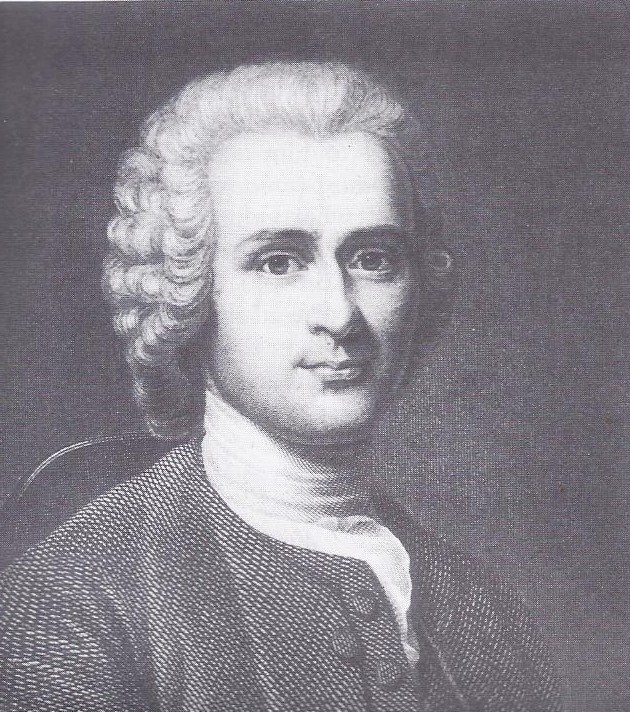
Demand for reform was widespread. Voltaire, Montesquieu, and Rousseau were the best-known writers of the times. Like seeds blown by the wind, their ideas of free government were carried far and took root in many lands. There were others, too, who proposed changes and reforms. An Italian named Beccaria wrote against the use of torture and the death penalty. Denis Diderot, a French writer, published a remarkable seventeen-volume Encyclopedia. This gave full treatment to science and the arts, government, politics and stressed the need for reform. Montesquieu and Voltaire wrote articles for the Encyclopedia, as did other brilliant thinkers and writers of the time. Efforts to stop publication of the Encyclopedia were unsuccessful and it had wide influence among the French middle class.
By the 1700’s, then, the groundwork was laid for progress in personal freedom and democracy. To be sure, enlightened despots tried to keep alive the myth of the benefits of royal rule. The English people, however, had moved ahead on the road to freedom by limiting the powers of their monarchs and several writers had argued forcefully and persuasively for the rights of men.
The work of reform that had begun in England and on the mainland of Europe was to be carried forward in an age of revolution. This age began with the American Revolution of 1776, about which we will read.
